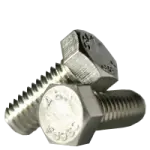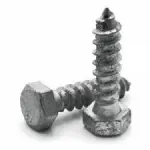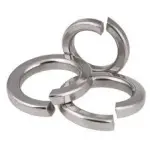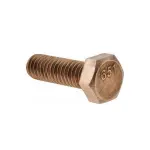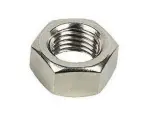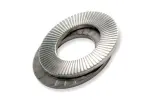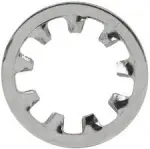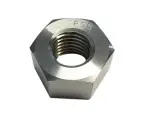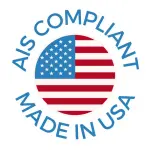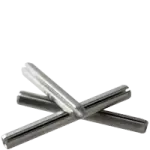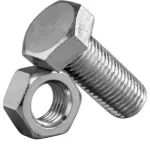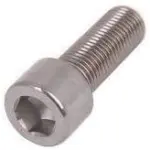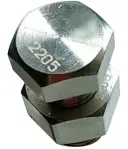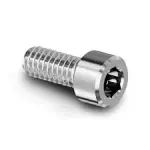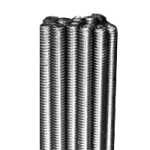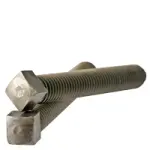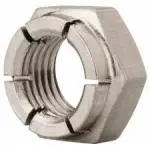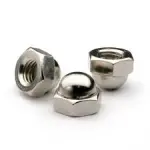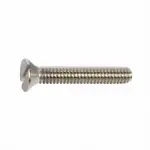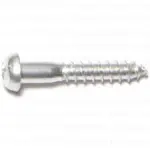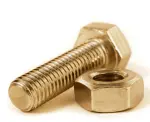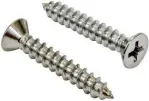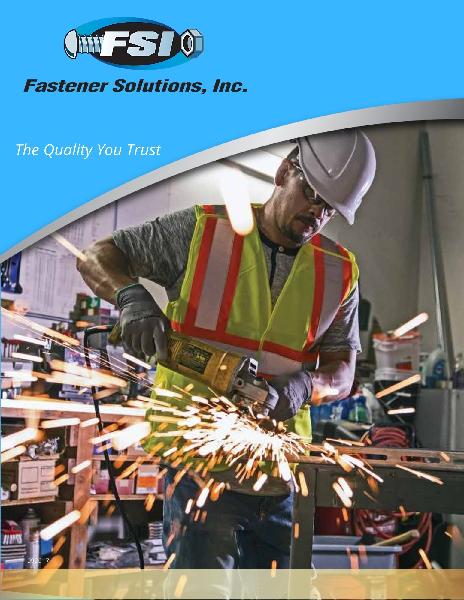Shop by Materials
Fasteners are regularly manufactured from numerous types of materials, including less expensive common materials and increasingly expensive rare metals. These materials are then often broken down into further grades within each metal or material. The fastener material grades have their own unique characteristics that differentiates themselves from other grades within the same material category.
Contact us for more information regarding our fastener material grades and bolt and fastener coating types, or call us at 866-463-2910 with any questions that you may have. View our list of materials.
Replacing Your Industrial Fasteners? Let Us Help You Choose the Best Materials
Industrial fasteners are manufactured in a wide range of materials, including: common steel, titanium, plastic, and a bevy of exotic materials. These materials are further separated into different grades to describe specific alloy mixtures, hardening processes, and more depending on your specific project needs. In addition, some materials are available with a variety of coatings or plating to enhance the corrosion resistance or appearance of the fastener.
In addition, fastener materials can be extremely important when choosing a fastener due to differences between a material's strength, brittleness, corrosion resistance, galvanic corrosion properties, and cost.
Keep Your Inventory Stocked With Custom Vender-Managed Inventory Services
Never face the stress of running low on your fastener inventory again. At Fastener Solutions, our vendor-managed inventory services are designed to keep your fasteners supplied automatically, ensuring your shelves stay fully stocked. We also offer custom kitting services, providing pre-packaged fastening products in your desired quantities. Save time, maximize efficiency, and experience the benefits of Fastener Solution's customer VMI solutions.
Choosing the Best Fastener Coatings Materials for Industrial Fastener Replacement
When replacing fasteners, it is generally best to match the replacement with the current fastener material that is being replaced. Replacing a bolt with a stronger one can be a dangerous endeavor. Firmer bolts tend to be more delicate and may fail in specific applications. To counteract this problem equipment is often designed so that the bolts will fail before more expensive or critical components are damaged. Some additional aspects that should be considered include the following:
- Understand the Application – If the parameters of the application are understood it makes material selection a lot simpler.
- Correct Fastener Selection – The entire embodiment of the fastener should be considered before making a final selection, including the threads.
- Material Makeup of the Fastener – Depending on the application and the fastener material that is chosen, there can be different grades of that material. It is imperative that the correct grade is selected so the application is not immediately bound for failure.
- Vendor Selection – Being able to rely on a dependable and expertly driven like Fastener Solutions is your first step towards less stress and a successful project.
For more information regarding our industrial fasteners or the materials and coatings we offer, contact our knowledgeable sales staff today.
Fastener Material Selection Options
Fastener Solutions carries a wide range of material and fastener coating options for your industrial fastener needs. Our line of material and coating options includes but are not limited to the following materials:
Duplex Stainless Steel 2205
This advanced quality stainless steel provides superior mechanical strength than lower grade alloys, with approximately twice the proof of strength of austenitic stainless steel. In addition, 2205 duplex performs well up to 600°F and offers excellent workability and weldability. In addition, duplex 2205 contains at least 22% chromium, 6% nickel and 3% molybdenum.
Super Duplex 2507 Stainless Steel
Super duplex 2507 is a chromium, molybdenum and nickel driven stainless steel that exceeds all stainless steel requirements. This stainless steel also provides exceptional strength and corrosion resistance. In addition, super duplex 2507 is also highly useful in corrosive environments where crevice corrosion and pitting resistance is necessary.
17-4PH Stainless Steel
Stainless Steel 17-4PH is a precipitation hardening martensitic stainless steel. Typical usage is seen in applications requiring high strength and a modest level of corrosion resistance. Stainless steel 17-4PH
contains the following material amounts, 15 - 17% chromium, 3 - 5% nickel, 3 - 5% copper.
18.8 Stainless Steel
This type of stainless steel is non-magnetic and can be hardened by cold working; a tensile strength range of 80-200,000 psi; good corrosion resistance. The term 18.8 is used interchangeably to characterize fittings made of 302, 302HQ, 303, 304, 305, 384, XM7, and other variables of these grades with close chemical compositions. Stainless 18.8 contains the following materials, approximately 18% chromium, 8% nickel.
304L & 316L Stainless Steel
Austenitic 304L and 316L stainless steels are considered some of the most weldable of the alloy steels. Alloys 304L and 316L exhibits excellent corrosion resistance and has a high ease of fabrication, outstanding formability. Material considerations for these alloys, include: a minimum of 18% chromium and 8% nickel.
316 Stainless Steel
This molybdenum-bearing austenitic stainless steel demonstrates better overall corrosion resistant properties than the 304 alloy, especially regarding pitting and crevice corrosion in chloride environments. The material content of 316 includes: 8% chromium, 8% nickel, and 2-3% molybdenum.
410 Stainless Steel
This unique style of stainless steel provides superior wear resistance and can be hardened. It's also an excellent corrosion resistant metal. Stainless steel 410 is used for cutlery, nozzles, valve parts and more. It contains a minimum of 11.5% chromium.
Alloy 20 Nickel Chromium Stainless Steel
Alloy 20 is a nickel–chromium–molybdenum stainless steel alloy great for applications involving sulfuric acid. Other uses include the chemical, food, pharmaceutical, power generation, and plastics industries due to its corrosion resistance. It contains approximately 34% nickel and 20% chromium.
Aluminum 2024
This aluminum product has an optimal surface finish quality and perfect for machinability. Aluminum 2024 is also a medium grade high strength material, with excellent workability that is commonly utilized in aircraft construction. Material ingredients include: 93% aluminum, 4% copper.
Aluminum 6061
Aluminum alloy 6061 product was developed in 1935 and maintains good mechanical properties and exhibits good weldability. It is one of the most common alloys of aluminum for general purpose use.
Aluminum Bronze
Aluminum bronze is one of the strongest alloys within the copper-based family of metals It provides high strength, with large aluminum and iron contents. Aluminum bronze can also be hardened in a few different ways through the combination of solid solution strengthening and cold workings. Aluminum bronze material contents include: 89% copper, 7% aluminum, 2% iron.
Brass
Due to its corrosion resistant properties, brass material is often used in marine and water saturated environments. Brass provides extreme workability, corrosion resistance and good strength qualities. Brass is made up of the following alloys: 65% copper, 35% zinc.
Chrome Plating
Chrome is often used strictly for its alluring appearance, but it also provides outstanding corrosion resistance and is often used to cover stainless steel, which creates a premium corrosion resistant material.
Hastelloy C-276
This nickel, chromium, molybdenum alloy is extremely versatile and corrosion resistant. It displays outstanding welding characteristics and has excellent resistance to pitting, oxidation and corrosion cracking. Hastelloy C-276 consists of: 60% nickel, 16% molybdenum, 15% chromium.
Hot Dip Galvanizing
Hot dipped galvanizing puts the thickest possible coating on the metal resulting in superior corrosion resistance. This process involves layering the metal being coated with applications of zinc, which creates the galvanized coating.
Inconel
This alloy provides a high resistance to corrosion, oxidation, carburization, pitting, crevice, corrosion cracking, and maintains a high-temperature strength. Inconel is widely used in extreme environments where tremendous heat and corrosion resistance is the key to the integrity of the finished product. The material content of Inconel includes: 70% nickel, 12% chromium, 2% iron.
Monel 400
This nickel-copper alloy is resistant to the harsh corrosion and temperatures of seawater, steam at high temperatures, and other caustic solutions. It also displays good corrosion resistance and has a potential for good weldability. Monel 400 contains approximately 65% nickel, 32% copper.
Monel 500
Monel 500 is a nickel-copper alloy, can be precipitation hardened through additions of aluminum and titanium. It has approximately three times the yield strength and double the tensile strength when compared with 400. It can be further strengthened by cold working before the precipitation hardening. This material contains approximately 65% nickel, 30% copper, 3% aluminum.
Silicon Bronze 651 & 655
These silicon bronze alloys are stronger and provide increased corrosion resistance over brass. They are often used within electrical circuitry, process control equipment and valves. Silicon bronze 651 & 655 contain roughly 95-97% copper, 2-3% silicon, 1% manganese.
Titanium
Titanium is a lightweight metal with an excellent overall strength-to-weight ratio. This highly touted metal also provides high temperature durability and good corrosion resistance. Titanium is regularly used within both the aeronautics and aerospace industries.
Zinc Plating
Galvanizing through the application of zinc plating provides extreme corrosion resistance to its metal substrate. Zinc plated products are often utilized in coastal environments and in treated lumber where the added chemicals to the wood may corrode the metal.
Additional Considerations for Fastener Material Selection
There are other aspects that should also be considered before making any final decisions regarding your fastener material selections. Depending on your specific project needs, the following factors may or may not have as much weighted value, these include:
- Corrosion Resistance – Corrosion takes place when the conditions of the outside environment break down the materials within the applied fastener. Oxidation, which causes rust, is the most common form of corrosion. If your intended application will be installed in a corrosive environment a corrosion-resistant fastener coating should be used.
- Proof Stress – The overall strength of your alloy is measured in pounds per square inch (psi) and is referred to as proof stress. Lower acceptable proof stress materials, such as steel and carbon steel are used for advanced strength applications.
- Temperature Settings – Hot or cold, the active temperature at which the fastener will be applied should also be considered before making any final decisions. Certain materials and alloy grades will hold up better than others depending on the application.
Contact Fastener Solutions for Fastener Coating Types & Materials Today
Contact us for more information regarding our fastener material selection options, or request a quote today for an in-depth price analysis.
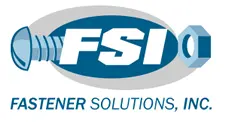

.png)
